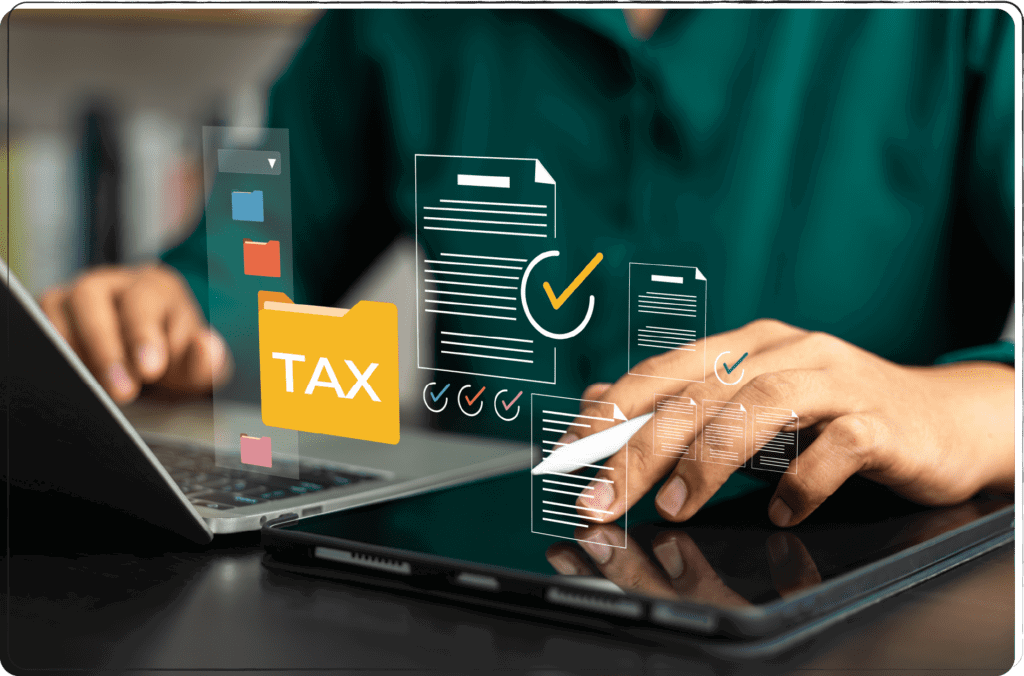Stephanie Kirk
As portfolio professionals, we make money in a variety of ways – freelance work, running businesses, consulting, teaching, entrepreneurship and other general gig situations – so how can we know where to begin when it comes to managing our diverse income streams?
After almost thirty years working for other people, I finally started working for myself this year. Straight away I needed to make sure I was tax savvy, and not just because I’m a Brit living in the Netherlands. It quickly became clear that using my network back in the UK to find work was going to prove profitable, but what did it all mean for taxes?
Luckily, I’ve learned loads from my community and the experts at The Portfolio Collective, and I’m gonna share some of their top tips for staying on top of your tax responsibilities as a portfolio professional.
It starts with understanding the tax implications of portfolio work
Do you remember Ken Dodd? A well known and well loved comedian from the 70s and 80s, Dodd found himself in court in 1989 charged with tax evasion. Investigators discovered there was very little money in his bank account, but what equates to over 1.1 million today in cash in suitcases under his bed. His defence at the time said, “some accountants are comedians, but comedians are never accountants”.
Though we’re not (all) comedians in the community, our tax obligations differ significantly from those of traditional employees. And a lot of that comes down to the fact that we don’t automatically have tax deducted from every invoice paid. We’re responsible for keeping on top of that ourselves, and there are lots of things to consider when doing so to avoid penalties and optimise financial outcomes.

Let’s start with the penalties. If you’re found to be evading tax payments, you can be fined an unlimited amount and even end up in 6 x 8 foot cell. If that doesn’t worry you, then what might do the trick is the HMRC Current List of Deliberate Tax Defaulters. I have to admit I went down a bit of a rabbit hole on this one when I found it, being nosey as to who had been fined. But the key feeling that surfaced was nausea at the thought of ever being named on it.
Even if you’re earning just a little from a side hustle, you’re eligible to pay tax. In fact, anything over £1,000 from self-employment annually is considered taxable income in the UK. And lots of other countries have similar rules, so you must register with your country’s governing body.
If you haven’t yet, do it now. And then start squirrelling away a little every month to make sure you have enough to pay that tax bill when it’s due.

When you register, common options include operating as a sole trader or establishing a limited company (LTD). The choice can depend on factors like income levels, administrative preferences and legal considerations
A sole trader tends to merge personal and business finances, while going LTD establishes the business as a separate legal entity. Then there’s the Limited Liability Partnership (LLP), less common for solo portfolio careers, which allows two or more individuals to form a partnership with limited liability.
If you get stuck, find a professional who can help
Are you confused yet? I was. As a new starter, I struggled to answer just these questions, but a good hack is to outsource to a relevant individual. Or, as I now like to call it, ‘find a hero’. And there are plenty of tax experts in the TPC community to turn to.
While portfolio professionals can manage their own taxes, engaging an accountant can be extremely beneficial. Often, it can work out financially in your favour, especially if the accountant is charging you less than what you’re charging your clients – that gives you the time to work on the things that matter most rather than getting bogged down in taxes.
I often take this approach. Especially when I don’t live in my home country and all the tax documents are in Dutch. Going online to a Facebook group for immigrants in my area, I was able to get a recommendation for a Dutch accountant who had helped many others with my conundrums.

Even if you don’t live abroad, accountants provide guidance on complex tax scenarios, ensuring compliance whilst also optimising tax benefits.
‘Evasion’ of tax is illegal; ‘avoidance’ of tax is actually defined as “action taken to lessen tax liability and maximise after-tax income,” which is a direct quote from an IRS document though you can find many other countries reference the same thing. So an accountant can stop you making terrible errors whilst also maximising how you plan to get the best profits from what you earn.
The better you manage your taxes, the more you can save
When I first worked for myself, before I got an accountant, I thought, how hard can it be? I figured I could google translate the files and just put the right numbers in the right boxes. However, effective tax management is crucial for portfolio career success. And that’s because I didn’t realise how much I could save when I did things properly.
Allowable business expenses, when documented meticulously, can reduce your taxable income. So if you, like myself, work from home some of the time and commute into a client’s office other times, remember there are things like home office deductions, travel expenses, utilities and professional tools you can claim back.

Finance director, community member and mentor on the “Help to Grow” scheme, Vic Mistry explains that HMRC offers a simplified fixed-rate deduction of £312 per year for home office use and “once you claim that, you don’t have to worry about working out whether you’ve got capital gains to concern you when you come to sell. It’s a very simple and clean way of dealing with it”. That’s definitely not something I would have known myself!
The most obvious advice? Get the tech
There are so many tools out there to help you file your taxes correctly – like Taxd or Crunch, which are specific to self-employed professionals. There are also loads of online calculators available to estimate take-home salary and determine tax residency status. And if you’re in the UK, you can always refer back to the HMRC website for authoritative information on tax regulations, allowable expenses and filing procedures.
Our top recommendations for portfolio professionals

Plan early
Address tax implications from the outset of your portfolio career to avoid unexpected bills and penalties.

Stay informed
Tax laws change, so be aware of the shifting regulations relevant to your specific situation.

Be financially disciplined
Set aside a portion of income for taxes to avoid financial strain when payments are due.

Keep meticulous records
Use tools to track expenses and income thoroughly to ensure accurate reporting and optimise deductions.

Find a hero
Engage with tax professionals when needed, particularly as earnings increase or income streams become more complex.
And if you still don’t know what to do, post your question in the community! You may come across another professional that has encountered the same unique problem or situation as you who can provide some sage advice. Take your guidance from them and avoid the comedians.
Our final bit of advice? Don’t forget to file on time!
Think this sounds like the right path for you? Come along to our monthly Community Welcome Call for new members to find out what a portfolio career could look like and how The Portfolio Collective can help you take those first steps towards professional success – and don’t forget to connect with our community!





